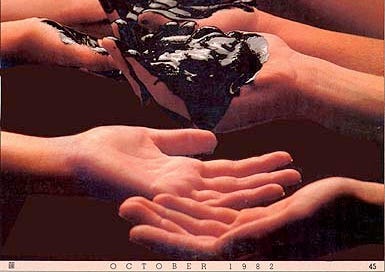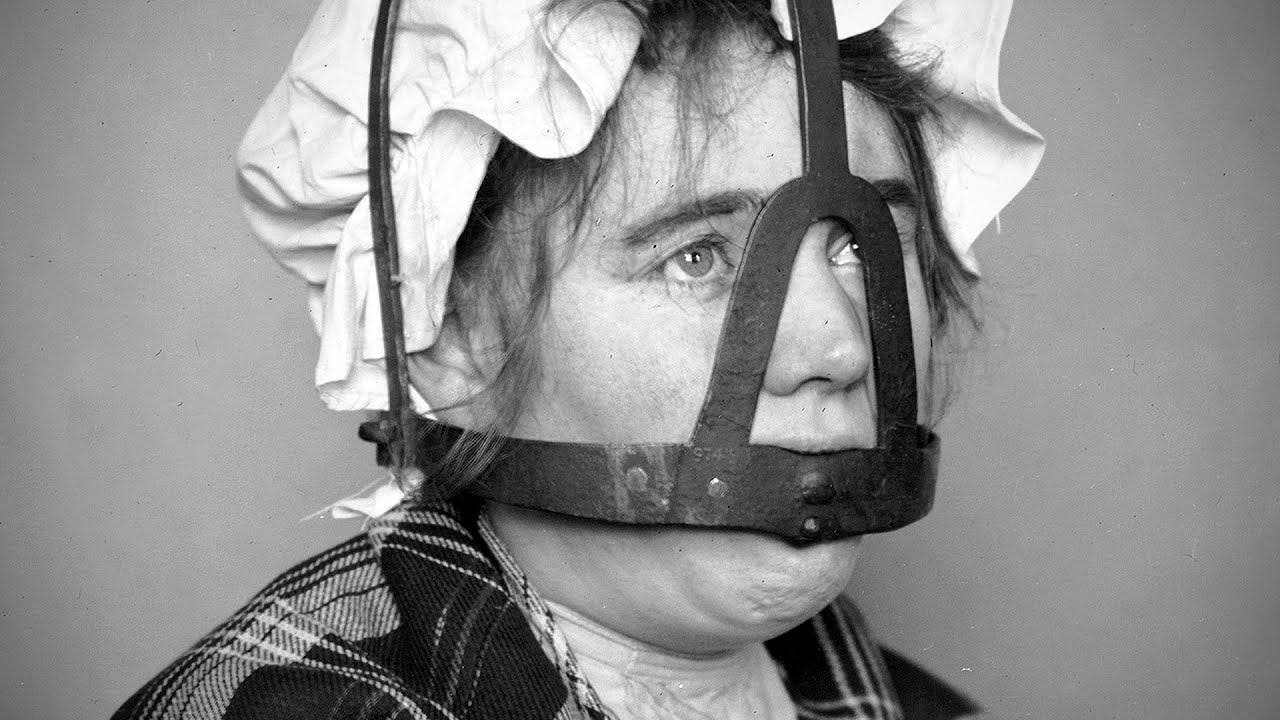As a teen, I had this MormonAd poster hanging on my bedroom wall:
Image from LDS Blogs
MormonAds were a series of images designed to look like advertisements teaching gospel messages. I’m guessing any Mormon kid that grew up in the 80s-00s can recall at least one of these. They hung in seminary rooms, homes, got passed around Sunday School classes, and were full page spreads in church magazines.
This particular ad was quite popular. I remember seeing it many times growing up and at some point in my teenage years I thumbtacked it to the large bulletin board in my room.
The message is fairly obvious. When you spread gossip, you spread sludge. And at the time, it seemed innocent enough of a message.
In my church experience, gossiping is one of the worst sins, spoken about over and over again in Young Women’s and Relief Society. Outside of church, gossipers are “bitches” telling lies and rumors just to ruin other’s lives for fun. Gossip is a dirty word, one of the most horrific things you can do.
Before I dive in, I hope it goes without saying that speaking unkindly, judgmentally, and with true, malicious intent about other people is wrong. It’s not something we should engage in, nor is it loving or Christlike. But that’s not actually gossiping in the traditional sense and that’s what I want to explore together. I’ve learned in the last few years that gossip itself isn’t and shouldn’t be synonymous with wickedness.
Roll up for the magical history tour with me:
The word gossip actually comes from the word God. Originally “godsibb,” it was a term for spiritual affinity and affection, or godparent. It also has associations with childbirth, when women would gather together to help a mother bring a child into the world.
In the Middle Ages, gossip was meetings of friends and community, where people would gather together and spread news, share information, and discuss everything from spousal disputes to politics.
Over time, gossip became more associated with women and female friendships. Both men and women gossiped, but because women were more confined to the domestic sphere and didn’t usually have the luxury of gathering in private like men, women’s gossip became very visible, and in turn, seen as dangerous. When men gossiped, they were viewed as doing important things, like business or politics. But when women gossiped, they were a threat, talking among themselves and forming strong networks outside of the growing patriarchal control on society.
Women bonding together could make them too powerful. They could be talking about men. They could be forming opinions and sharing information that men didn’t want them to share. Gossip also became associated with too much freedom for women, including sexual freedom, which caused major anxiety.
The patriarchy and the church then became heavily invested in shutting this down. Women gathering together were often seen as suspect, even labeled as witch covens sometimes. Gossiping became associated with idleness, evil speaking, and sin. The ruling culture saw the subversive power of gossip and called it malicious and frivolous to help curb it.
Image from Feminism in India
But what were these women actually “gossiping” about?
Gossip was and is a survival tool. It’s what makes society work. Gossip does often include discussing other people, but it’s not meant to be about rumor or drama or sin; it’s about knowing who and what is safe. It’s about protecting each other and growing networks of trust. Gossip creates social glue and community unity. Gossip is literally what helped humans survive.
Gossiping creates human connection and stability. It can even release hormones like oxytocin and serotonin. Gossip is more than idle chatter. It constructs narratives and stories that pass on knowledge to protect ourselves and future generations.
So why then, would gossip turn into something evil?
Image from Feminism in India. This picture is a woman wearing a "gossip’s bridle” that was used as a form of punishment and often had a spike where the tongue was placed.
Ah, good old patriarchy. We meet again.
Gossip only became evil when it became associated with women and femininity. It was a strategic move for those in power to assuage their anxieties and fears, and to stay in power. The vilification of gossip upholds patriarchy and misogynistic power structures.
When women create groups beyond men’s control and oversight, that’s a threat to patriarchal structure. (Why do you think the Relief Society had their autonomy revoked in the 20th century to be brought under the male authority of the priesthood?) If gossip thrives in women-run groups, then those groups must be shut down or labeled as vicious gossip halls for those with too much time on their hands.
Gossip is often a tool of the disenfranchised and the oppressed. Those in power have keen interests in keeping those without power from obtaining more through collective knowledge and gathering. Calling the spread of information wicked gossip that shouldn’t be taken seriously helps clamp down on those communities.
Powerful men fear gossip will expose them. What happens when too many women start sharing the truth of how they’ve been treated? Look at the #metoo movement. Suddenly, men’s worst acts are being acknowledged out loud for all to see. They cry “character assassination” instead of taking accountability. But really, women are just surviving, sharing so others can protect themselves and so society can hold dangerous men accountable for their actions.
Similarly, gossip exposes predators. When women can speak together and warn others, predators have a harder time finding new victims. But as with many parts of the “boy’s club” mentality, most patriarchal men will go astonishing lengths to protect abusers. Look at the LDS Church’s record on protecting victims of sexual abuse and lobbying for clergy privilege to not turn in child predators.
Misogynistic portrayals of gossip are rampant. Men talking together is important. Women talking together is idle. In Mormon culture, when men talk together about the people in the ward, it’s considered an important part of helping to save souls. But when women talk together at the end of a Relief Society meeting, it’s frivolous and detrimental, back-biting and maligning others.
Gossip is similarly weaponized against women in popular media portrayals, often depicting “bitchy” girls as spreading lies and attacking each other. Women have been convinced by popular culture for far too long that gossiping means turning on each other, policing, and harming each other. When it’s shown over and over as something highly negative, it’s no wonder women treat gossip as suspect. So female-led networks break down even further, continuing to prop up patriarchal power because women are trained to not speak with one another for fear of engaging in this negative stereotype.
Image from Getty Images
But what if gossip isn’t what we’ve been lead to believe it is? What if it’s a part of a woman’s DNA because for thousands of years, this was how we survived? What if that’s not inherently sinful, but rather our God-given natures? What if it’s only wicked because men and those in power see it as a threat and twist it into something evil?
Brother Marvin J. Ashton shared this story in General Conference in 1986: “I am acquainted with a wife and mother who is chained securely at the present time to a life-style of murmuring and criticism. She is the first to point out faults in her husband or to repeat neighborhood gossip. How damaging is a habit that permits fault-finding, character assassination, and the sharing of malicious rumors! Gossip and caustic comments often create chains of contention. These chains may appear to be very small, but what misery and woe they can cause!”
I don’t know who this woman was or what she did. Perhaps she was truly a mean woman who spoke evil of others for fun. But more likely, she was a Mormon housewife, stuck at home with little to engage herself with beyond kids and husband and housework. When she expressed any unhappy feelings to her husband, he told her she was complaining. When she asked him to step up and be more of a partner, he accused her of finding fault with him. When she sought out the help of other Mormon moms to vent and hopefully find ways to cope, priesthood men called her a gossip, spreading contention and salacious rumors to be negative.
This woman wasn’t wicked—she was drowning. She was doing what her biology told her to do—seek help, form communities, share her struggles. But men don’t want it that way. Their egos can’t handle knowing that they might need to improve and become a better partner. Their dogmas of traditional gender roles can’t take the scrutiny of peeling back the shiny veneer to see how much they chain and belittle women. Their control might slip if women form their own strong networks outside of their dominance.
And so the men call it wicked. Male leaders stand at pulpits and throw it back to us as a sin. Women, who’ve been raised to comply and obey their priesthood leaders, internalize that guilt. They do everything in their power to shut down their natural instinct to gossip and survive. They call out other women for daring to do it, enforcing the patriarchy themselves. (In the words of the prophetess Taylor A. Swift: women like hunting witches too, doing your dirtiest work for you) Women share in church and confess their sins of daring to speak with frustration to their husbands or for having feelings at all. (I’m not exaggerating this. Go to a Relief Society meeting sometime.)
And outside of the church it isn’t much better at all.
But I’m done with that nonsense.
I’m reclaiming gossip.
Call me a witch, a temptress, a sinner.
I’m too exhausted from all the knots I have to tie myself into as a woman to care anymore.
I need gossip. I need community. I need groups of women to help me shoulder the struggle and survive. I need to know who is dangerous to be around, what could harm my family, who isn’t what they say they are. I need to express my feelings—true, real feelings, not ones I’ve filtered through my “good mormon woman” lens. I need to be able to be angry, sad, scared, cautious, skeptical. I need to be contentious sometimes.
Patriarchy would divide us so we can’t overthrow it. Priesthood men would claim our inclinations are sinful so they can sell us back our own salvation.
But I’m taking myself out of their narrative and reclaiming my own. The one Heavenly Mother, the Divine Feminine, surely gave me. The one evolution provided me with so I would be safe and whole.
Perhaps you’ll consider joining me. We can’t do this overnight, but we can restore our power and our spaces in small ways, day by day— Don’t internalize the guilt for having feelings and talking about them. Ignore them when they try to shut you down for sharing important information with others. Form women’s groups and meet frequently just to be together. Don’t give men power or control over your gossip.
Survive. Share. Love. They are terrified of what we can achieve together.









Layers and layers to this, nailed it again Linda!